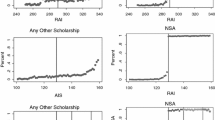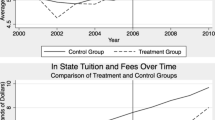Abstract
In Malaysia, government scholarships have been utilized on a large scale in order to achieve the employment restructuring objectives of the New Economic Policy (NEP). This article provides an empirical evaluation of the effectiveness of this policy instrument, based on a comprehensive survey of the 1982/83 graduates. The results show that scholarship policy is now: (1) generating a mismatch in the High-Level Manpower (HLM) market and (2) that these scholarships are distributed in a heavily regressive manner, benefiting students from the wealthier and higher-income families.
Similar content being viewed by others
References
Ali, Syed H. (1981). The Malays, Their problems and Future, Selangor: Heinemann.
Carnegie Commission on Higher Education (1970). Quality and Equality. Revised Recommendations. San Francisco: McGraw Hill.
Chai Hon-Chan (1977). Education and Nation Building in Plural Societies, the West Malaysian Experience. Canberra: Australian National University.
Malaysia (1973). The Report of the Manpower Survey in Malaysia. Kuala Lumpur: Government Printer.
Malaysia (1976). The Third Malaysia Plan, 1976–1980. Kuala Lumpur: Government Printer.
Malaysia (1984). Mid-Term Review of the Fourth Malaysia Plan, 1981–1985. Kuala Lumpur: Government Printer.
Mazumdar, D. (1981). The Urban Labour Market and Income Distribution in Peninsular Malaysia. New York: Oxford University Press.
Meerman, J. (1979). Public Expenditure in Malaysia. Who Benefits and Why? New York: Oxford University Press.
Mehmet, O. (1984). Regional Cooperation in High-Quality Manpower Development: The Feasibility of an ASEAN Student Aid Fund. Singapore: RIHED.
Mehmet, O. (in press). Poverty, Wealth and Trusteeship: An Evaluation of the Malaysian New Economic Policy. London: Croom Helm.
Mehmet, O. and Yip Yat Hoong (1984). An Economic Analysis of the Malaysian University System: Its Impact on Manpower Development and Human Capital. Kuala Lumpur: Institute of Advanced Studies, University of Malaya.
Muzaffar, C. (1979). Protector? An Analysis of the Concept and Practice of Loyalty in Leader-Led Relationship within Malay Society. Penang: Aliran.
New Strait Times, (1983, 21 oct.). “Bonded grads told to seek jobs elsewhere.” Kuala Lumpur.
Slimming, J. (1969). Malaysia; The Death of a Democracy. London: J. Murray.
Yip Yat Hoong, (1983). “The cost of university education in Malaysia” RIHED Bulletin 10: 1–25.
Woodhall, M. (1983). Student Loans as a Means of Financing Higher Education, Lessons from International Experience. Washington: World Bank Staff Working Papers #599.
Author information
Authors and Affiliations
Rights and permissions
About this article
Cite this article
Mehmet, O., Hoong, Y.Y. An empirical evaluation of government scholarship policy in Malaysia. High Educ 14, 197–210 (1985). https://doi.org/10.1007/BF00137484
Issue Date:
DOI: https://doi.org/10.1007/BF00137484




